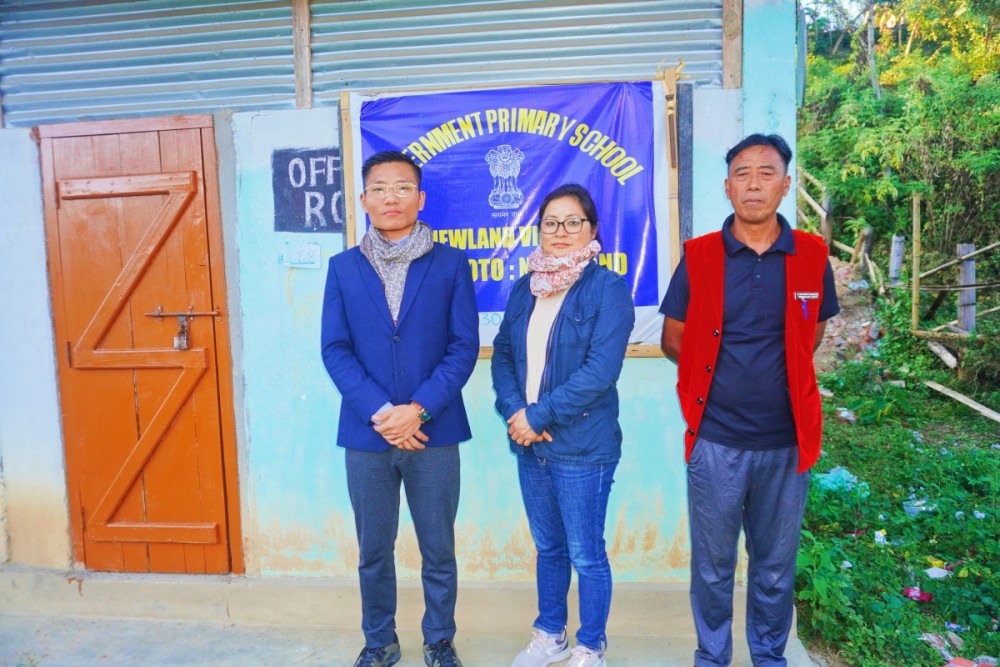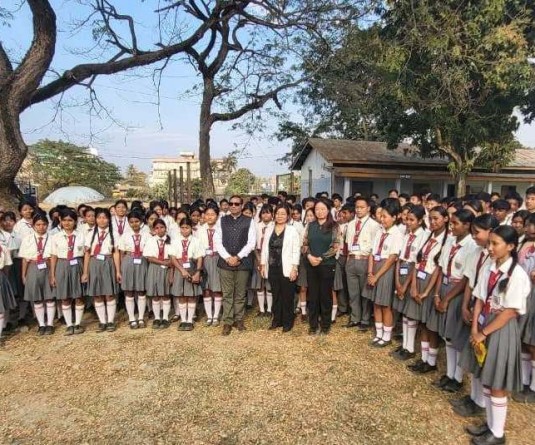
Zunheboto, November 15 (MExN): The NECTAR (Nagaland Education-Curriculum, Teaching, and Resources) Project, an initiative launched by the Government of Nagaland in collaboration with the World Bank, has made “significant strides in improving the infrastructure, teaching methods, and overall educational environment in schools across the region.”
According to a press release received here, a recent inspection led by L Chinglem Konyak, Zunheboto EAC (HQ), provided key insights into the project’s impact on local schools, including GMS New Colony, GPS Lizu Naghuto, GMS North Point, GMS Old Town, GPS Asukho A, GMS Kulhopu, GPS Nikuto, GMS Ghukiye, and GPS Newland.
The NECTAR Project, which began in 2020, was designed to address critical gaps in school infrastructure and quality education delivery. Under this project, the government allocated significant funds for the renovation of school buildings, the improvement of teaching and learning materials, and the purchase of necessary office supplies. According to reports from teachers, the financial support provided by the project has enabled schools to maintain and enhance their facilities, fostering a better learning environment for students, the press release claimed.
Improvement in school infrastructure
Before the implementation of the NECTAR Project, each school received around Rs 7500 to Rs 7800 annually for office maintenance which “was very difficult to maintain the school.” However, since the Project’s introduction, these funds have been more effectively utilized to renovate school infrastructure. Teachers reported that this has led to visible improvements in classrooms, sanitation facilities, and overall school environment, making the schools more conducive to quality education.
The Project also emphasises the active participation of the community, including church leaders, GB,s village councils, Parents and Teachers Associations (PTAs), and other stakeholders. This community-based approach has played a pivotal role in ensuring transparency, minimizing corruption, and maximizing the impact of the funds allocated for school development. As highlighted by the EAC Zunheboto during the inspection, the involvement of all community members in the NECTAR Project has created an environment where the chances of corruption are virtually eliminated.
Challenges in Student Enrollment
One of the major challenges that schools face, especially at the village level, is low student enrollment. The report indicates that many parents give preference for private schooling, are reluctant to send their children to government-run institutions. Konyak acknowledged that the status of many families, particularly in rural areas, contributes significantly to this trend.
To address this issue, the EAC Zunheboto called on the local communities to encourage parents to send their children to school, emphasizing that the government may take over underperforming schools if enrollment does not improve.
Government schools and private institutions
While government schools have made notable progress, the EAC Zunheboto pointed out that the overall enrollment in government schools remains low in comparison to private schools, particularly at the matriculation level. He also noted that while government-run institutions provide high-quality education due to the expertise and experience of the teachers, challenges still exist in terms of poor results at the matriculation level.
He suggested that this could be attributed to the lack of proper guidance and mentorship for students at critical stages in their academic careers. He stressed the need for continued investment in teacher training and the improvement of teaching methodologies to ensure that students receive a well-rounded and quality education.
Future for education in Nagaland
Konyak concluded that the involvement of the entire community, coupled with the government's efforts to monitor and regulate the funds, makes the NECTAR Project a beacon of hope for education in Nagaland.” With continued focus on improving student enrollment and addressing gaps in education quality, the NECTAR Project has the potential to create a lasting positive impact on the educational landscape in the state.
As the first phase of inspections for the NECTAR Project was done in April and May, with 16 schools being inspected, district administration and school officials continue to focus on ensuring the success and sustainability of the programme.






